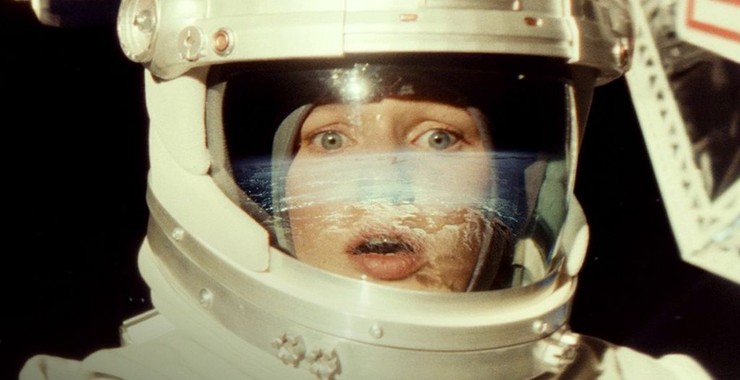
Plot is not a primary concern in the close-at-hand speculative fiction of Rubikon (2022): that’s not to suggest it’s another of those art installation type films which evades a storyline completely, but it is a slow, quiet, morose kind of film on the whole. It could easily have been done very differently. A few things are established early on: it’s 2056; only the wealthiest can afford the purified air necessary for survival, thanks to the perilous state of Earth’s environment; it’s corporations, not governments, who say what goes – fighting wars amongst themselves, even employing their own militias. This all seems to invite some kind of action movie, but actually, whatever’s going on down on Earth is discussed or observed from a terrific distance, both physically and metaphorically.
High above the decimated planet, a vast space station orbits: the job of its crew is to try to do something, anything to help fix the atmosphere. We start with two new arrivals to the station, each coming from a different faction on Earth but forced to get on thanks to the confined quarters, etc. Hannah (Julia Franz Richter) is military, Gavin (George ‘Versailles’ Blagden) the son of a top executive; they’re the proverbial odd couple. Accordingly, each of them draws down the suspicions of the existing crew for various reasons, but there’s work to be done – an updated mission, in fact, taking them on a new path over the planet with a different objective.
To be honest, the details of this mission never became very clear to this reviewer: it took reading around after the fact to really understand it. This isn’t helped by the fact that the incidental music seems to drown out the dialogue in places, and the pan-European cast each using English as a lingua franca leads to some genuine-seeming communication lapses, but ultimately, the issue here is that this plot element is not strongly represented in the script itself. It turns out to be something like this: ship’s doctor Dmitri (everyman actor Mark Ivanir) has been researching algae, which could provide oxygen and food for the beleaguered population. Some of the astronauts are about to take a sample of this with them on their new mission; then, the key event occurs (and there’s no mistaking that, at least). Earth is very quickly obscured by a vast, rolling wall of what looks like smog, which takes out systems and communications (bad news for the crew who are currently out there, reliant on technology to fly them) but, potentially, this smog does far more. There are some brief moments of interaction which reveal that people down on the ground are fleeing for their lives; how successfully remains to be seen.
So what to do? Stay on the space station – which can be self-sufficient for the foreseeable future – or keep trying to contact Earth? A tough choice, albeit treated quite obliquely; Rubikon certainly has a set of running themes, and one of these is the decision between personal wants and the ‘greater good’. For all that, the film runs aground for a frustrating period of time around the hour mark. It stops almost completely, with clipped conversations and hints at future decisions here and there, but little beyond that, save for one plot addition which is so teeth-grindingly predictable as a way of adding ‘a moral complication’ that it almost destroys the goodwill the film has built up. Still, it takes an interesting perspective by placing the potential last of humanity in orbit, and asking them to weigh up their own safety against altruism, particularly possibly fatal altruism. And then, something occurs which adds greater urgency to their decisions.
This all comes to us via an overall attractive, often innovative piece of sci-fi. Green-screen is used carefully; the module and the station look very…ordinary actually, nothing too striking or different from modernity in terms of aesthetics (a plausibly annoying tangle of wires and cables irritates the crew trying to fix things). But some of the shots used are genuinely chilling and evocative, the roiling clouds passing over the Earth look great, and we get plenty of familiar-feeling, pleasing sci-fi bits. You know the ones. The zero gravity, the spiritual-seeming beams of light from the sun, the dangerous jobs which need to be done outside the station; all are present and correct.
So: many elements look good, the film’s budget has been wrung to the max, the overall idea is sound, and it’s given an unusually languid, dream-gone-sour treatment here. Rubikon offers an interesting spin on a moral quandary, and thankfully it veers away from any simplistic proselytising about the environment; that would be a tedious, jarring add-on to all the dreaminess. It would definitely benefit from losing a good twenty minutes – it’s too loose in places – but there’s (just) enough spectacle and material here to hold interest, particularly for those who like an element of philosophy in their sci-fi, or simply appreciate the spectacle which sci-fi offers.
Rubikon (2022) will appear at the watchAUT Austrian Film Festival taking place in London between 23rd-26th March 2023. For more details, please click here.
